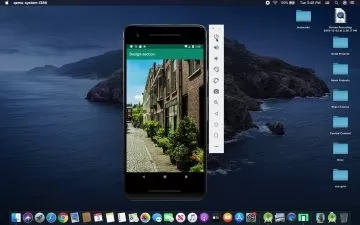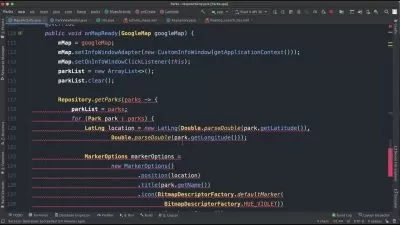IntelliJ IDEA Mastery: Unleashing Developer Productivity
EDUCBA Bridging the Gap
2:07:05
Description
Elevate your coding proficiency with course covering installation, navigation, coding techniques, and advanced features
What You'll Learn?
- Efficient Usage: How to efficiently navigate and utilize IntelliJ IDEA's interface for effective software development.
- Coding Techniques: Advanced coding techniques, including coding templates, inspections, code folding, and indentation for optimized development.
- Version Control Integration: Seamless integration with Git for version control, enabling collaborative development and project management.
- Debugging Skills: Essential debugging techniques to identify and fix bugs, ensuring code reliability and functionality.
- Integration with Technologies: Integration with Maven for project management and databases for effective data manipulation.
- Advanced Topics: In-depth exploration of Groovy, structural search, and customization through plugins to unlock the full potential of IntelliJ IDEA.
Who is this for?
What You Need to Know?
More details
DescriptionIntroduction:
Welcome to "IntelliJ IDEA Mastery: Unleashing Developer Productivity." In this course, you will embark on a journey to become proficient in one of the most powerful integrated development environments (IDEs) available to developers today. Whether you're a novice programmer or an experienced developer, mastering IntelliJ IDEA will significantly enhance your productivity and efficiency in software development.
Course Overview:
IntelliJ IDEA is renowned for its extensive set of features, intelligent code assistance, and seamless integration with various technologies and frameworks. Throughout this course, you will explore IntelliJ IDEA's capabilities from installation to advanced usage, covering essential topics such as project management, coding techniques, debugging, version control, and more.
What You'll Learn:
Installation and Setup: Learn how to install IntelliJ IDEA on different operating systems, configure settings, and customize the IDE according to your preferences.
Navigating the IDE: Explore the various views and perspectives within IntelliJ IDEA, including project view, file view, and source code navigation.
Coding Techniques: Master coding techniques such as using coding templates for faster development, performing code inspections for improved code quality, and optimizing code organization with code folding and indentation.
Version Control Integration: Understand how to integrate IntelliJ IDEA with version control systems like Git, enabling seamless collaboration and code management within your projects.
Debugging and Testing: Learn essential debugging techniques for identifying and fixing bugs in your code, as well as testing methodologies to ensure the reliability and functionality of your applications.
Integration with Other Technologies: Explore how IntelliJ IDEA integrates with other technologies and frameworks, such as Maven for project management and databases for data manipulation.
Advanced Topics: Delve into advanced topics such as Groovy programming language, structural search, and customization through plugins, unlocking the full potential of IntelliJ IDEA.
Conclusion:
By the end of this course, you will have gained the confidence and expertise to navigate IntelliJ IDEA proficiently, write high-quality code efficiently, and optimize your development workflow for maximum productivity. Let's embark on this journey to master IntelliJ IDEA together!
Section 1: Introduction
In this introductory section, learners are provided with a comprehensive overview of IntelliJ IDEA, a feature-rich integrated development environment (IDE) widely used for Java development and other programming languages. The discussion highlights the significance of IntelliJ IDEA in enhancing developer productivity and simplifying the software development process. Furthermore, the section delves into the key features and benefits offered by IntelliJ IDEA, emphasizing its robust set of tools for code editing, debugging, version control, and more. Additionally, learners are introduced to the general layout and interface of IntelliJ IDEA, setting the stage for the subsequent exploration of its functionalities.
Section 2: Installation
The installation process of IntelliJ IDEA is thoroughly covered in this section, ensuring learners understand the system requirements and prerequisites necessary for a successful installation. Detailed steps are provided to guide learners through the installation process, including downloading the IDE, selecting appropriate installation options, and configuring settings as needed. Furthermore, the section addresses the generation of properties files, allowing learners to customize the IDE's appearance and behavior according to their preferences. This section aims to equip learners with the knowledge and skills required to set up IntelliJ IDEA effectively on their respective systems.
Section 3: IDEA Views
This section focuses on familiarizing learners with the various views and perspectives available within IntelliJ IDEA. Learners are introduced to essential view modes such as project view and file view, which facilitate navigation and organization of project resources. The section also explores the AutoScroll feature, enabling seamless navigation between source code and corresponding files for enhanced productivity. Moreover, integration with Git version control and management of Maven projects are discussed, providing learners with essential skills for efficient project management within IntelliJ IDEA.
Section 4: Coding Templates and Inspections
In this section, learners delve into advanced coding techniques and best practices facilitated by IntelliJ IDEA. The discussion begins with coding templates, which offer predefined code snippets for common programming tasks, enabling developers to write code more efficiently. Additionally, learners explore code inspections, which help identify and rectify potential issues in the codebase, ensuring code quality and maintainability. The section also covers code folding and indentation techniques for better code organization and readability. Furthermore, learners are introduced to the installation and management of plugins, expanding the IDE's functionality to meet specific project requirements.
Section 5: Debugging Application Server and Searching
This section focuses on essential debugging techniques and search capabilities within IntelliJ IDEA. Learners gain insights into debugging application servers, including setting breakpoints, stepping through code, and analyzing runtime data to identify and resolve bugs effectively. Moreover, the section explores IntelliJ IDEA's powerful search features, enabling learners to search for files and classes within the project with ease. Additionally, structural search functionality is discussed, allowing learners to efficiently locate code patterns and refactor codebase as needed.
Section 6: Groovy
The final section delves into Groovy, a dynamic programming language compatible with the Java Virtual Machine (JVM). Learners are provided with a detailed introduction to Groovy, covering its syntax, features, and benefits. The discussion includes essential topics such as conditional operators, loops, closures, and lambda expressions, enabling learners to leverage Groovy's capabilities for enhanced productivity and flexibility in software development. Furthermore, integration with databases and tools for database management are explored, empowering learners to work seamlessly with databases within IntelliJ IDEA and extract data effectively for analysis and manipulation.
Who this course is for:
- Software Developers: Both novice and experienced developers looking to enhance their proficiency with IntelliJ IDEA and streamline their software development process.
- Java Developers: Individuals working with Java or Java-related technologies seeking to maximize their productivity and efficiency with IntelliJ IDEA.
- Web Developers: Professionals involved in web development projects who wish to leverage IntelliJ IDEA's capabilities for frontend and backend development.
- Students and Educators: Students studying programming and computer science disciplines, as well as educators teaching software development courses.
- Tech Enthusiasts: Individuals interested in learning about popular integrated development environments and advancing their coding skills.
- Professionals in IT Industry: IT professionals and professionals from related fields aiming to expand their knowledge and skills in software development tools and practices.
Introduction:
Welcome to "IntelliJ IDEA Mastery: Unleashing Developer Productivity." In this course, you will embark on a journey to become proficient in one of the most powerful integrated development environments (IDEs) available to developers today. Whether you're a novice programmer or an experienced developer, mastering IntelliJ IDEA will significantly enhance your productivity and efficiency in software development.
Course Overview:
IntelliJ IDEA is renowned for its extensive set of features, intelligent code assistance, and seamless integration with various technologies and frameworks. Throughout this course, you will explore IntelliJ IDEA's capabilities from installation to advanced usage, covering essential topics such as project management, coding techniques, debugging, version control, and more.
What You'll Learn:
Installation and Setup: Learn how to install IntelliJ IDEA on different operating systems, configure settings, and customize the IDE according to your preferences.
Navigating the IDE: Explore the various views and perspectives within IntelliJ IDEA, including project view, file view, and source code navigation.
Coding Techniques: Master coding techniques such as using coding templates for faster development, performing code inspections for improved code quality, and optimizing code organization with code folding and indentation.
Version Control Integration: Understand how to integrate IntelliJ IDEA with version control systems like Git, enabling seamless collaboration and code management within your projects.
Debugging and Testing: Learn essential debugging techniques for identifying and fixing bugs in your code, as well as testing methodologies to ensure the reliability and functionality of your applications.
Integration with Other Technologies: Explore how IntelliJ IDEA integrates with other technologies and frameworks, such as Maven for project management and databases for data manipulation.
Advanced Topics: Delve into advanced topics such as Groovy programming language, structural search, and customization through plugins, unlocking the full potential of IntelliJ IDEA.
Conclusion:
By the end of this course, you will have gained the confidence and expertise to navigate IntelliJ IDEA proficiently, write high-quality code efficiently, and optimize your development workflow for maximum productivity. Let's embark on this journey to master IntelliJ IDEA together!
Section 1: Introduction
In this introductory section, learners are provided with a comprehensive overview of IntelliJ IDEA, a feature-rich integrated development environment (IDE) widely used for Java development and other programming languages. The discussion highlights the significance of IntelliJ IDEA in enhancing developer productivity and simplifying the software development process. Furthermore, the section delves into the key features and benefits offered by IntelliJ IDEA, emphasizing its robust set of tools for code editing, debugging, version control, and more. Additionally, learners are introduced to the general layout and interface of IntelliJ IDEA, setting the stage for the subsequent exploration of its functionalities.
Section 2: Installation
The installation process of IntelliJ IDEA is thoroughly covered in this section, ensuring learners understand the system requirements and prerequisites necessary for a successful installation. Detailed steps are provided to guide learners through the installation process, including downloading the IDE, selecting appropriate installation options, and configuring settings as needed. Furthermore, the section addresses the generation of properties files, allowing learners to customize the IDE's appearance and behavior according to their preferences. This section aims to equip learners with the knowledge and skills required to set up IntelliJ IDEA effectively on their respective systems.
Section 3: IDEA Views
This section focuses on familiarizing learners with the various views and perspectives available within IntelliJ IDEA. Learners are introduced to essential view modes such as project view and file view, which facilitate navigation and organization of project resources. The section also explores the AutoScroll feature, enabling seamless navigation between source code and corresponding files for enhanced productivity. Moreover, integration with Git version control and management of Maven projects are discussed, providing learners with essential skills for efficient project management within IntelliJ IDEA.
Section 4: Coding Templates and Inspections
In this section, learners delve into advanced coding techniques and best practices facilitated by IntelliJ IDEA. The discussion begins with coding templates, which offer predefined code snippets for common programming tasks, enabling developers to write code more efficiently. Additionally, learners explore code inspections, which help identify and rectify potential issues in the codebase, ensuring code quality and maintainability. The section also covers code folding and indentation techniques for better code organization and readability. Furthermore, learners are introduced to the installation and management of plugins, expanding the IDE's functionality to meet specific project requirements.
Section 5: Debugging Application Server and Searching
This section focuses on essential debugging techniques and search capabilities within IntelliJ IDEA. Learners gain insights into debugging application servers, including setting breakpoints, stepping through code, and analyzing runtime data to identify and resolve bugs effectively. Moreover, the section explores IntelliJ IDEA's powerful search features, enabling learners to search for files and classes within the project with ease. Additionally, structural search functionality is discussed, allowing learners to efficiently locate code patterns and refactor codebase as needed.
Section 6: Groovy
The final section delves into Groovy, a dynamic programming language compatible with the Java Virtual Machine (JVM). Learners are provided with a detailed introduction to Groovy, covering its syntax, features, and benefits. The discussion includes essential topics such as conditional operators, loops, closures, and lambda expressions, enabling learners to leverage Groovy's capabilities for enhanced productivity and flexibility in software development. Furthermore, integration with databases and tools for database management are explored, empowering learners to work seamlessly with databases within IntelliJ IDEA and extract data effectively for analysis and manipulation.
Who this course is for:
- Software Developers: Both novice and experienced developers looking to enhance their proficiency with IntelliJ IDEA and streamline their software development process.
- Java Developers: Individuals working with Java or Java-related technologies seeking to maximize their productivity and efficiency with IntelliJ IDEA.
- Web Developers: Professionals involved in web development projects who wish to leverage IntelliJ IDEA's capabilities for frontend and backend development.
- Students and Educators: Students studying programming and computer science disciplines, as well as educators teaching software development courses.
- Tech Enthusiasts: Individuals interested in learning about popular integrated development environments and advancing their coding skills.
- Professionals in IT Industry: IT professionals and professionals from related fields aiming to expand their knowledge and skills in software development tools and practices.
User Reviews
Rating
EDUCBA Bridging the Gap
Instructor's Courses
Udemy
View courses Udemy- language english
- Training sessions 24
- duration 2:07:05
- Release Date 2024/04/23









